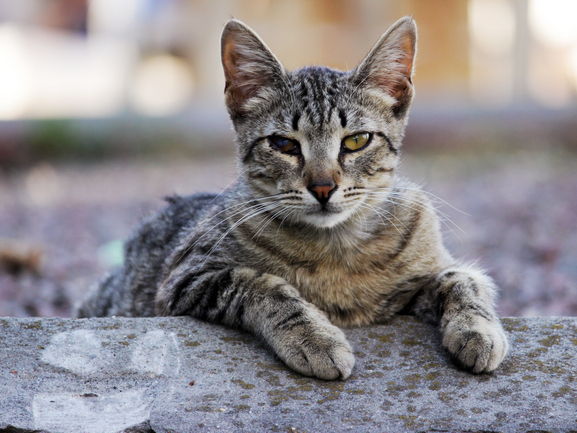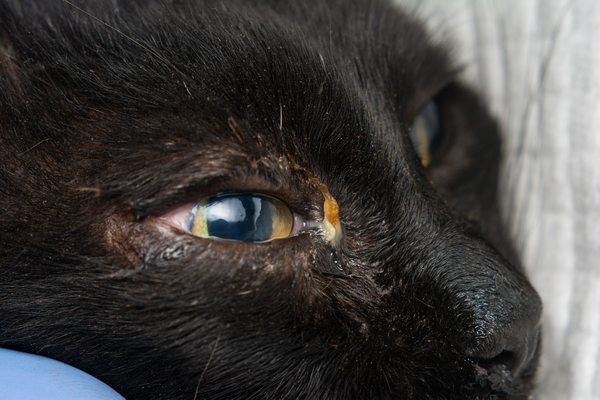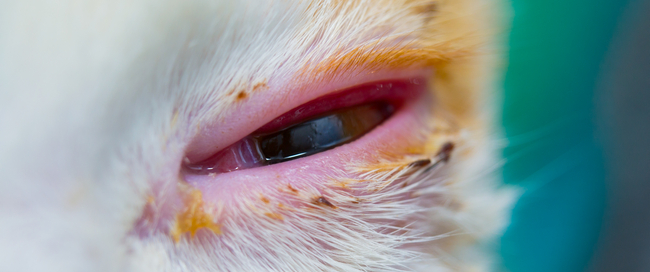Feline herpesvirus causes, symptoms and prevention
What is feline herpesvirus?
Feline herpesvirus (FHV-1) causes upper respiratory infections (flu) and ocular (eye) disease in cats. It can lead to multiple symptoms including, conjunctivitis, a sore throat, sneezing and coughing. Occasionally, it can cause skin disease.
It’s highly contagious and can spread quickly. This happens when a cat who isn’t carrying the virus comes into contact with an infected cat. Often this might be by licking their food bowl, sharing a litter tray, or brushing against their owner’s clothes.
What are the feline herpesvirus symptoms?
If your cat has become infected with this virus, they will usually show symptoms around two to six days later. While each cat’s symptoms may be different, the most common signs of cat herpes are:
- Conjunctivitis (pink, sore eyes)
- Sneezing
- Blocked or runny nose
- Runny eyes
- Green goop around the eye
- Cold sores
- Loss of appetite
- Lethargy
- Fever
- Salivation
Cat Herpes is often called ‘cat flu’ as the signs can mirror our own flu symptoms. In reality, cat flu is not a specific disease — it’s a general term for feline upper respiratory infections, which are usually caused by either feline herpesvirus, feline calicivirus, or both.

If your cat has cat flu, their behaviour may change, and they might feel quite sorry for themselves. They may hide away more, sleep a lot or show changes to their appetite. If you see changes in your cat’s behaviour, even if they aren’t showing other symptoms, seek advice from your vet.
How is feline herpesvirus spread?
The herpes virus is found in infected cats’ saliva and the discharges that come from the eyes and nose. It can spread through direct and indirect transmission.
Direct transmission is when your cat is in physical contact with virus particles directly from an infected cat, perhaps a neighbouring cat, or while staying in a cattery.
Indirect transmission is when your cat comes into contact with something an infected cat has touched. This could be bedding, food and water bowls, litter trays or even your hands or clothes.
How common is feline herpesvirus in cats?
Because it’s so contagious, cat herpes is one of the most common viruses to affect cats. Incredibly, 97% of cats will be exposed to the cat herpes virus during their lifetime. Most infected cats recover well, but many (around 80%) will remain carriers — where the virus is never fully eliminated and persists in the nerve cells. In many cats, this is not a problem as the virus doesn’t cause symptoms anymore, or spread to other cats, but around 45% of cats will shed the virus at some point, usually when they’re stressed, potentially spreading infection to others and showing further symptoms themselves.
Which cats are most at risk?
While all cats are at risk of catching cat herpes, young kittens and unvaccinated cats are more at risk of developing severe infections.
How is feline herpesvirus diagnosed?
Your cat’s symptoms will give your vet a strong idea of what’s wrong — and, in most cases, these will be enough for a presumptive diagnosis. It’s not possible to diagnose cat herpes for certain without sending a swab to a lab for testing.

Feline herpesvirus treatment
There’s no cure for cat herpes. If your cat is infected with the virus, they will likely carry it for the rest of their lives. Your vet will be able to treat the symptoms, however, and most cats do make a full recovery and live full and happy lives.
Supportive care
The mainstays of treating cat herpes is to provide relief from the symptoms. Gently wiping away discharge from the nose and eyes, providing a warm, comfortable environment and ensuring good access to food and water are all essential. Severe herpesvirus cases can stop eating and drinking completely and need hospitalising at the vets for a fluid drip and even a feeding tube.
Antibiotics
Cat herpes causes damage to the delicate structures of the nose, throat and eyes, and this often leads to secondary bacterial infections. Supportive treatment with antibiotics is often required. If your vet thinks that opportunistic bacteria are causing some of the symptoms, they will prescribe antibiotics, which may be given orally into the mouth, or applied topically to the eyes.
Stress management
The virus can live in cats without affecting them physically. But the virus may ‘reactivate’ during times of stress. Stress can be brought on by a house move, a threat to their territory or even a change in their owner’s routine.
Keeping stress to a minimum can reduce flare-ups. If you know your cat’s environment will change, try to introduce things slowly. If you’re planning on bringing a new animal into the house, ensure your cat has a safe space where they can go to relax.
Anti-viral medication
Certain anti-viral drugs can be used against cat herpes. Famciclovir is effective against the virus, and is safe to use in cats. It’s given by mouth, but usually only prescribed for more severe cases. Anti-viral medications are also available as eye-drops for those cats whose eyes are badly affected. These medications are all human anti-virals, and must be discussed with a vet.
Interferon
Interferons are proteins which act against viruses. There is some evidence to suggest that interferon therapy may be helpful in treating symptoms of the herpesvirus infection.
Lysine supplements
Lysine is an amino acid supplement which may be able to help treat the symptoms of this virus. It can be given in tablet, powder or paste form and should only be used if prescribed by your vet.
How can cat herpes be prevented?
Even though a high percentage of cats will contract the virus, there are things you can do to help prevent infection. These include:
Feline herpes vaccine
Vaccines work by giving your cat a modified version of the virus or disease, which teaches their immune system what to look for and what defences it needs to destroy the virus. Vaccination doesn’t prevent your cat from being infected with herpesvirus, but can dramatically lessen the symptoms.
Your cat should receive the vaccine for this virus at around nine weeks and then again three weeks later, with a booster every one to three years. This will keep your cat’s immune system primed to deal with any herpesvirus invasion. Cats who join Pet Health Club™ get this vaccination as part of the subscription plan.
Isolation
Can a cat with herpes be around other cats? Given how contagious cat herpes is, isolating your cat will reduce their chances of catching it. This is particularly important if there’s an outbreak in a multi-cat home or a cattery. Cleaning all areas an infected cat may have come into contact with will also reduce the risk of the virus spreading to other cats. Hygiene should be well-maintained when taking care of an infected cat, as the virus can survive on clothing and skin.
Indoor cats
Indoor cats have a much smaller chance of catching cat herpes. However, you should still vaccinate your indoor cat as the virus can survive for a long time on clothes and shoes.
Is feline herpesvirus fatal?
Kittens and unvaccinated cats with poor immune systems, such as those battling cancer, have an increased risk of dying from the disease. But most cats infected with this virus will make full recoveries within five to 21 days. Although the symptoms may return over time, they shouldn’t have a lower quality of life than cats who don’t carry the virus.
Is there a feline herpesvirus life expectancy?
There are no studies (that we’re aware of) into the average lifespan of cats carrying this virus. With proper management, most cats will live long, healthy lives. But life expectancy will vary depending on the cat’s age and whether they have underlying health conditions.
Can cats get cold sores from humans?
Humans and cats — and dogs for that matter — each have their own unique form of herpesvirus so there’s no risk of cats getting herpes from humans or vice versa.



